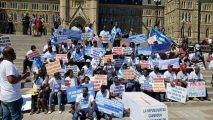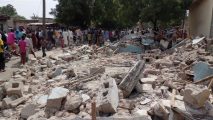Categories
Recent Posts
- Yaoundé: Defense Ministry says “Clear Alliance” between Boko Haram and criminals in recent attack
- Football: MTN Elite One resumes after boycott threats
- Biya’s election season stirs renewed anxiety in Southern Cameroons
- Revealed: Boko Haram fighters kill 20 Cameroonian troops
- Niger: military leader Tiani sworn in as president for five-year transition period
Archives
- March 2025
- February 2025
- January 2025
- December 2024
- November 2024
- October 2024
- September 2024
- August 2024
- July 2024
- June 2024
- May 2024
- April 2024
- March 2024
- February 2024
- January 2024
- December 2023
- November 2023
- October 2023
- September 2023
- August 2023
- July 2023
- June 2023
- May 2023
- April 2023
- March 2023
- February 2023
- January 2023
- December 2022
- November 2022
- October 2022
- September 2022
- August 2022
- July 2022
- June 2022
- May 2022
- April 2022
- March 2022
- February 2022
- January 2022
- December 2021
- November 2021
- October 2021
- September 2021
- August 2021
- July 2021
- June 2021
- May 2021
- April 2021
- March 2021
- February 2021
- January 2021
- December 2020
- November 2020
- October 2020
- September 2020
- August 2020
- July 2020
- June 2020
- May 2020
- April 2020
- March 2020
- February 2020
- January 2020
- December 2019
- November 2019
- October 2019
- September 2019
- August 2019
- July 2019
- June 2019
- May 2019
- April 2019
- March 2019
- February 2019
- January 2019
- December 2018
- November 2018
- October 2018
- September 2018
- August 2018
- July 2018
- June 2018
- May 2018
- April 2018
- March 2018
- February 2018
- January 2018
- December 2017
- November 2017
- October 2017
- September 2017
- August 2017
- July 2017
- June 2017
- May 2017
- April 2017
- March 2017
- February 2017
- January 2017
- December 2016
- November 2016
- October 2016
- September 2016
- August 2016
- July 2016
- June 2016
Featured
Most Commented Posts
 4 Anglophone detainees killed in Yaounde
4 Anglophone detainees killed in Yaounde
18 comments Chantal Biya says she will return to Cameroon if General Ivo Yenwo, Martin Belinga Eboutou and Ferdinand Ngoh Ngoh are sacked
Chantal Biya says she will return to Cameroon if General Ivo Yenwo, Martin Belinga Eboutou and Ferdinand Ngoh Ngoh are sacked
13 comments The Anglophone Problem – When Facts don’t Lie
The Anglophone Problem – When Facts don’t Lie
12 comments Anglophone Nationalism: Barrister Eyambe says “hidden plans are at work”
Anglophone Nationalism: Barrister Eyambe says “hidden plans are at work”
12 comments Largest wave of arrest by BIR in Bamenda
Largest wave of arrest by BIR in Bamenda
10 comments
Latest Tweets
Featured
-

Yaoundé: Defense Ministry says “Clear Alliance” between Boko Haram and criminals in recent attack
-

Football: MTN Elite One resumes after boycott threats
-

Biya’s election season stirs renewed anxiety in Southern Cameroons
-

Revealed: Boko Haram fighters kill 20 Cameroonian troops
-

Niger: military leader Tiani sworn in as president for five-year transition period
-

Over 10 Cameroon gov’t soldiers killed, 20 injured in Boko Haram attack
-

1982-2025: How long will Biya hang on?
© Cameroon Concord News 2025





29, April 2017
The Situation in Southern Cameroon: A Call for a Halt to Human Rights Repressions 0
The ILA (Nigeria) Committee on Justice and Human Rights, acting under the protective mandate of the African Charter on Human and Peoples’ Rights, is concerned over the ongoing events in the Republic of Cameroon and has considered it imperative to add its voice to the variously expressed opposition to the wanton violation of the rights of the people of English speaking Provinces of Cameroon by the Government of the Republic of Cameroon.
The facts upon which the intervention of the Committee is established, as verified by CNN, Amnesty International and the African Bar Association, are as follow:
III. That the Cameroon Anglophone Civil Society Consortium (CACSC) and Southern Cameroons National Council (SCNC), responded with series of strikes and “Operation Ghost Town” – a form of nonviolent resistance that requiring all supporters to stay at home;
Being aware that the issues leading to the current impasse are not new, the Committee takes cognisance of the following:
(a) that the current situation is intimately linked to the events that occurred in British Southern Cameroon in the context of decolonisation having its root in the League of Nations Mandate System that partitioned Cameroon between Great Britain and France and which culminated in the plebiscite of the United Nations on Southern and Northern Cameroon independence question;
(b) That matters arising from the plebiscite have been a subject of litigation and discussion at several international forums, particularly, at the International Court of Justice (ICJ) and the African Commission on Human and Peoples;
(c) That the Committee is aware that the facts presented to the African Commission on Human and Peoples Rights on the Southern Cameroon (‘Ambazonia’) in the case of Gorji-Dinka v Cameroon (2005) AHRLR 18 (HRC 2005), particularly, paragraphs 2.1 to 3.2, were unchallenged by the government of Cameroon;
(d) The Committee also takes cognisance of Kevin Mgwanga Gunme et al v Cameroon (communication 266/03) in which, after it had painstakingly considered the position of both parties, the African Commission made the following findings:
– transferring individuals from Southern Cameroon to Francophone Cameroon for trial by military tribunals,
– denying interpreters to those tried in civil law courts;
(e) Having carefully considered the similarities of behaviour of the government of Cameroon that gave rise to the aforementioned cases to those now being employed by the government (and which show that Cameroon failed to implement the recommendations of the Commission), it is the view of this Committee that for their currency and relevance to the presence situation, fitting to adopt and reiterate the recommendations and to strongly urge the Cameroonian government to take all necessary steps to implement the findings as an important step towards the resolution of the historic Southern Cameroon question.
(f) Accordingly, we call on the government of Cameroon to, among others:
Dr Amos O Enabulele,
Chairman
ILA (Nig) Committee on Justice & Human Rights